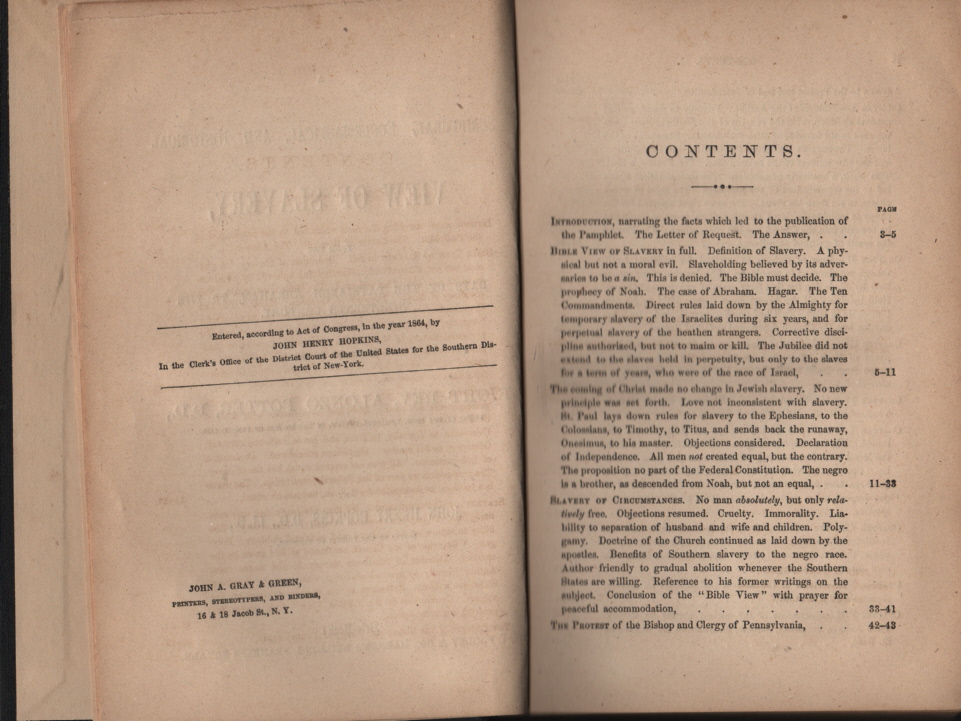
Author: HOPKINS, JOHN HENRY
Title: A Scriptural, Ecclesiastical, and Historical View of Slavery from the Days of the Patriarch Abraham to the Nineteenth Century Addressed to the Right Rev. Alonzo Potter, D.D.
Description: New York, NY: W. I. Pooley & Co, 1864. 1st Edition Thus; First Impression. Hardcover. Professionally rebound in black cloth with gilt print. Contents are original and look almost new, clean and bright. This is not a recent reprint or print on demand.Reverend Hopkins conviction is captured in his statement, "...while I should rejoice in the adoption of any plan of gradual abolition which could be accepted peacefully by general consent, I cannot see that we have any right to interfere with the domestic institutions of the South, either by law or by the Gospel." "John Henry Hopkins (January 30, 1792 – January 9, 1868) was the first bishop of Episcopal Diocese of Vermont and the eighth Presiding Bishop of the Episcopal Church in the United States of America. He was also an artist (both in water-color and in oils), a lawyer, an ironmonger, a musician and composer, a theologian, and an architect, who introduced Gothic architecture into the United States. In 1861, Hopkins wrote his "most controversial" pamphlet, The Bible View of Slavery, in which he criticized abolitionists and declared that no scriptural basis for ending slavery existed. The pamphlet was seen as Hopkins' attempt to justify slavery based on the Bible. He argued that slavery was not a sin per se. A major example of Hopkins coming under fire was the "bitter attack upon him during the War signed by Alonzo Potter, the then Bishop of Pennsylvania, and 163 other clergy of the Diocese of Pennsylvania." In the attack, Hopkins was called "wicked," and his views were called "unworthy of any servant of Jesus Christ." Hopkins' "come back" was an overwhelming citation of Holy Scripture, and of over one hundred historical authorities, ranging from St. Paul to Theodore Parker. Hopkins' "come back" was never answered. Hopkins' "religious awakening" happened during his first winter in the Ligonier Valley. He was alone, reading a work of Hannah More, when as Hopkins described it, "a sudden beam of divine Truth shone into his inmost heart." From that experience on, for the rest of his life, "the love of Christ Crucified" was Hopkins' "guiding and ruling principle". (Wikipedia) In spite of his convictions about slavery he was instrumental in helping the Episcopal Church in the North and South heal after the Civil War. We provide delivery tracking on US orders. Rare.; 12mo 7" - 7½" tall; 376 pages. Very Good with no dust jacket .
Keywords: Slavery Religion Race Abolition Episcopal Vermont
See more books from our catalog: African American: : Religion
Title: A Scriptural, Ecclesiastical, and Historical View of Slavery from the Days of the Patriarch Abraham to the Nineteenth Century Addressed to the Right Rev. Alonzo Potter, D.D.
Description: New York, NY: W. I. Pooley & Co, 1864. 1st Edition Thus; First Impression. Hardcover. Professionally rebound in black cloth with gilt print. Contents are original and look almost new, clean and bright. This is not a recent reprint or print on demand.Reverend Hopkins conviction is captured in his statement, "...while I should rejoice in the adoption of any plan of gradual abolition which could be accepted peacefully by general consent, I cannot see that we have any right to interfere with the domestic institutions of the South, either by law or by the Gospel." "John Henry Hopkins (January 30, 1792 – January 9, 1868) was the first bishop of Episcopal Diocese of Vermont and the eighth Presiding Bishop of the Episcopal Church in the United States of America. He was also an artist (both in water-color and in oils), a lawyer, an ironmonger, a musician and composer, a theologian, and an architect, who introduced Gothic architecture into the United States. In 1861, Hopkins wrote his "most controversial" pamphlet, The Bible View of Slavery, in which he criticized abolitionists and declared that no scriptural basis for ending slavery existed. The pamphlet was seen as Hopkins' attempt to justify slavery based on the Bible. He argued that slavery was not a sin per se. A major example of Hopkins coming under fire was the "bitter attack upon him during the War signed by Alonzo Potter, the then Bishop of Pennsylvania, and 163 other clergy of the Diocese of Pennsylvania." In the attack, Hopkins was called "wicked," and his views were called "unworthy of any servant of Jesus Christ." Hopkins' "come back" was an overwhelming citation of Holy Scripture, and of over one hundred historical authorities, ranging from St. Paul to Theodore Parker. Hopkins' "come back" was never answered. Hopkins' "religious awakening" happened during his first winter in the Ligonier Valley. He was alone, reading a work of Hannah More, when as Hopkins described it, "a sudden beam of divine Truth shone into his inmost heart." From that experience on, for the rest of his life, "the love of Christ Crucified" was Hopkins' "guiding and ruling principle". (Wikipedia) In spite of his convictions about slavery he was instrumental in helping the Episcopal Church in the North and South heal after the Civil War. We provide delivery tracking on US orders. Rare.; 12mo 7" - 7½" tall; 376 pages. Very Good with no dust jacket .
Keywords: Slavery Religion Race Abolition Episcopal Vermont
Price: US$ 149.97 Seller: A Book Legacy
- Book number: 43121
- Book number: 43121
See more books from our catalog: African American: : Religion